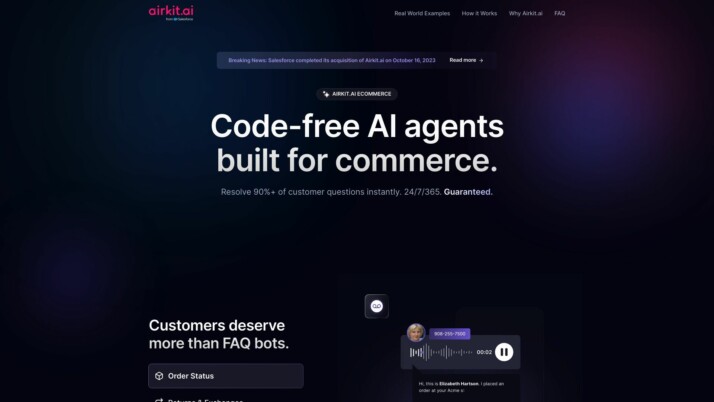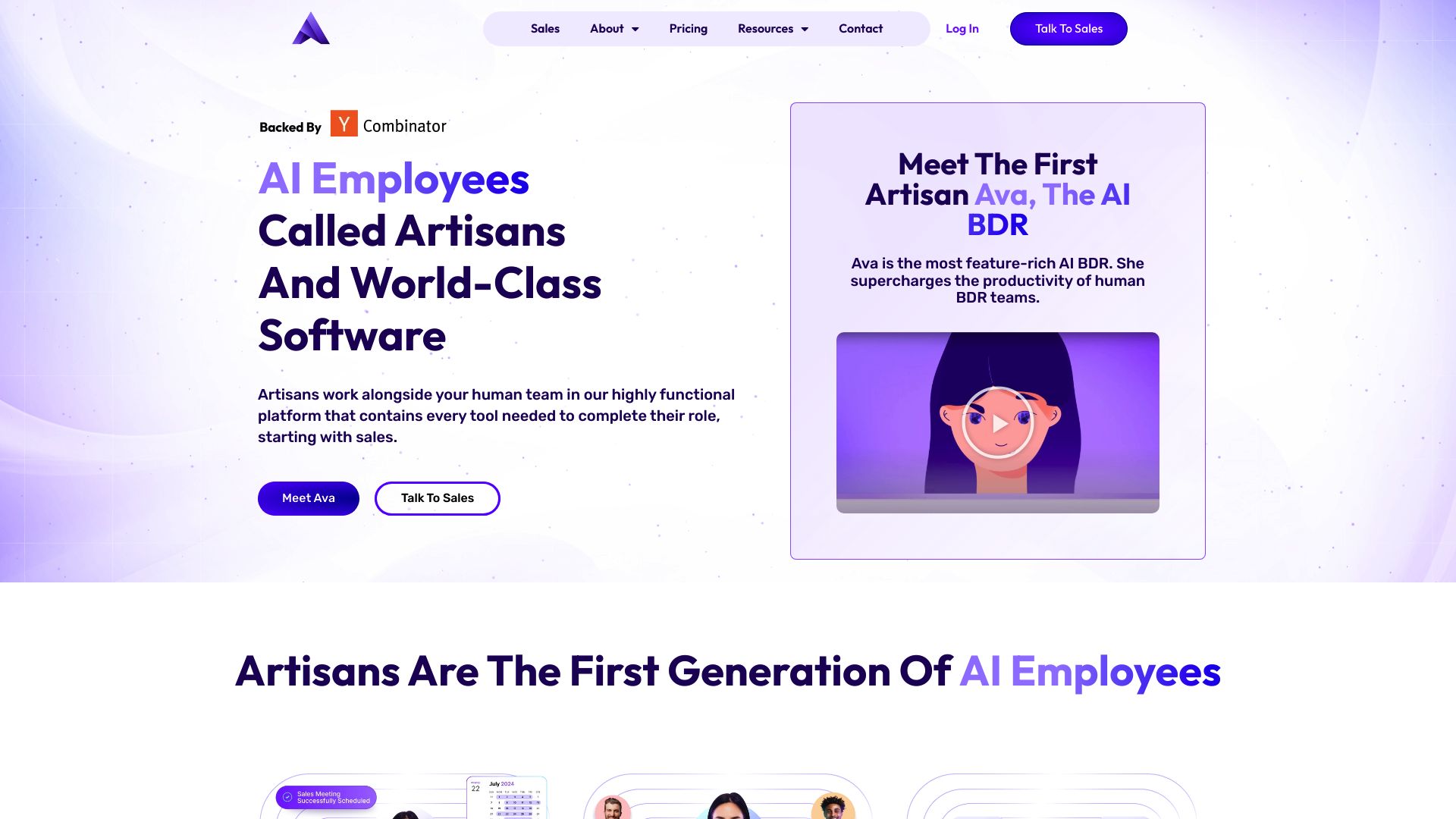The AI landscape evolves rapidly, offering powerful solutions for businesses to automate processes and enhance customer experiences. This comparison explores Airkit AI vs. Artisan AI, and SmythOS, three platforms at the forefront of AI-driven automation. Airkit AI, now part of Salesforce, specializes in customer service automation with its no-code AI agents. Artisan AI provides AI-powered digital workers, focusing on sales and marketing automation.
SmythOS emerges as a versatile platform, offering advanced features like visual builders, multi-agent collaboration, and extensive integration capabilities. This review delves into each platform’s strengths, limitations, and unique offerings, providing insights for businesses seeking to leverage AI across various domains. Whether you’re a developer, business leader, or AI enthusiast, this comparison will help you navigate the diverse landscape of AI automation tools and choose the solution that best fits your needs.
Airkit AI Overview
Airkit AI revolutionizes customer service with its AI-powered platform, now integrated into Salesforce’s ecosystem. The platform deploys intelligent, no-code AI agents capable of resolving customer queries across multiple channels. These agents learn continuously from business policies and customer interactions, providing personalized support 24/7.

Airkit AI revolutionizes customer service with its AI-powered platform … capable of resolving customer queries across multiple channels.
Airkit AI’s solution targets businesses seeking to streamline customer support operations. The platform excels in ecommerce scenarios, offering pre-built conversational skills tailored for common queries about orders, returns, and product information. By automating repetitive tasks, Airkit AI aims to prevent agent burnout and improve overall customer satisfaction.
Key features of Airkit AI include rapid deployment of AI agents without coding, cloud-based infrastructure with auto-scaling capabilities, and seamless integration with existing helpdesk and CRM solutions. The platform boasts the ability to instantly resolve over 90% of repetitive customer requests, significantly reducing response times and improving efficiency.
The platform boasts the ability to instantly resolve over 90% of repetitive customer requests, significantly reducing response times and improving efficiency.
Airkit AI emphasizes compliance and control, incorporating industry-best guardrails and safeguards. This focus on security and transparency addresses concerns about AI deployment in sensitive business environments. The platform’s Co-Pilot mode allows human agents to collaborate with AI, ensuring a balance between automation and human oversight.
While Airkit AI offers robust features for customer service automation, it may have limitations in areas like multi-agent collaboration or advanced debugging tools. The platform’s strengths lie in its ease of use, rapid deployment capabilities, and integration with Salesforce, making it particularly attractive for businesses already invested in the Salesforce ecosystem.
Artisan AI Overview
Artisan AI provides AI-powered digital workers called Artisans to automate business workflows and enhance productivity. These hosted AI agents integrate seamlessly with human teams, requiring no infrastructure or maintenance.

Artisan AI’s no-code platform enables users without programming skills to create and deploy autonomous AI agents. The initial product, Ava, functions as an AI sales representative to automate outbound sales processes. Artisan AI emphasizes integrating AI as digital team members to boost human productivity rather than replace jobs.
Artisan AI emphasizes integrating AI as digital team members to boost human productivity rather than replace jobs.
Key features include hosted environments for development and production, a no-code editor for easy deployment, and AI agents that learn continuously from business policies and customer data. The platform supports multimodal interactions across web chat, mobile, voice, and email channels. Artisan AI also provides industry-standard safeguards and compliance measures, ensuring transparency and security in AI operations.
While Artisan AI offers significant advantages in automating customer interactions and sales processes, it may have limitations in areas like debug modes or multi-agent collaboration. The platform’s focus on sales and marketing workflows could potentially restrict its applicability in other domains.
Artisan AI’s pricing model bases plans on the number of leads contacted per month, which may impact scalability for businesses with fluctuating needs. Integration capabilities with popular eCommerce and helpdesk systems suggest flexibility, but the extent of customization options remains unclear.
Feature Comparison
Airkit AI and Artisan AI offer distinct approaches to AI-powered business automation, each with its own strengths and limitations. Airkit AI excels in customer service automation, leveraging its integration with Salesforce to provide a robust platform for deploying AI agents across multiple channels. Its no-code environment and pre-built conversational skills for ecommerce make it particularly attractive for businesses looking to streamline customer support operations quickly.
In contrast, Artisan AI positions itself as a provider of AI-powered digital workers, emphasizing the integration of AI agents as team members to enhance human productivity. While both platforms offer hosted environments and no-code options, Artisan AI’s focus on sales and marketing workflows, particularly with its AI sales representative Ava, sets it apart from Airkit AI’s broader customer service approach.
However, SmythOS surpasses both in terms of versatility and advanced features. Unlike Airkit AI and Artisan AI, SmythOS provides a visual builder with drag-and-drop functionality, making it more accessible for users with varying levels of technical expertise. SmythOS also offers superior debugging tools, multi-agent collaboration capabilities, and a wider range of deployment options, including as APIs, webhooks, and GPTs. These features, combined with SmythOS’s robust integration ecosystem and support for various AI models, position it as a more comprehensive solution for businesses seeking to leverage AI across multiple domains beyond just customer service or sales.
Feature Comparison Table
| Airkit AI | Artisan AI | SmythOS | |
|---|---|---|---|
| CORE FEATURES | |||
| Environments (Dev, Production) | ✅ | ❌ | ✅ |
| Visual Builder | ❌ | ❌ | ✅ |
| Explainability & Transparency | ❌ | ❌ | ✅ |
| Debug Tools | ❌ | ❌ | ✅ |
| Multimodal | ❌ | ❌ | ✅ |
| Multi-Agent Collaboration | ❌ | ❌ | ✅ |
| Audit Logs for Analytics | ❌ | ❌ | ✅ |
| Work as Team | ❌ | ✅ | ✅ |
| Agent Work Scheduler | ❌ | ✅ | ✅ |
| Logs & Monitoring | ✅ | ❌ | ✅ |
| SECURITY | |||
| Constrained Alignment | ✅ | ❌ | ✅ |
| Data Encryption | ✅ | ❌ | ✅ |
| OAuth | ✅ | ❌ | ✅ |
| IP Control | ❌ | ❌ | ✅ |
| COMPONENTS | |||
| Foundation AIs | ❌ | ❌ | ✅ |
| Huggingface AIs | ❌ | ❌ | ✅ |
| Zapier APIs | ❌ | ❌ | ✅ |
| All other APIs, RPA | ✅ | ❌ | ✅ |
| Classifiers | ❌ | ❌ | ✅ |
| Logic | ❌ | ❌ | ✅ |
| Data Lakes | ❌ | ❌ | ✅ |
| DEPLOYMENT OPTIONS (EMBODIMENTS) | |||
| Deploy as API | ❌ | ❌ | ✅ |
| Deploy as Webhook | ❌ | ❌ | ✅ |
| Staging Domains | ❌ | ❌ | ✅ |
| API Authentication (OAuth + Key) | ❌ | ❌ | ✅ |
| Deploy as Site Chat | ✅ | ❌ | ✅ |
| Deploy as Scheduled Agent | ❌ | ❌ | ✅ |
| Deploy as GPT | ❌ | ❌ | ✅ |
| DATA LAKE SUPPORT | |||
| Hosted Vector Database | ❌ | ❌ | ✅ |
| Sitemap Crawler | ❌ | ❌ | ✅ |
| YouTube Transcript Crawler | ❌ | ❌ | ✅ |
| URL Crawler | ❌ | ❌ | ✅ |
| PDF Support | ❌ | ❌ | ✅ |
| Word File Support | ❌ | ❌ | ✅ |
| TXT File Support | ❌ | ❌ | ✅ |
Best Alternative to Airkit AI and Artisan AI
SmythOS stands out as the superior alternative to Airkit AI and Artisan AI, offering a comprehensive AI automation platform that surpasses both in versatility and capability. Our drag-and-drop interface empowers users of all skill levels to create sophisticated AI agents without extensive coding knowledge, making AI development accessible to a broader audience.
Unlike Airkit AI’s focus on customer service or Artisan AI’s emphasis on sales workflows, SmythOS provides a flexible foundation for building AI agents across numerous domains. We offer unparalleled customization options, allowing users to tailor agents for specific business needs while maintaining ease of use.
SmythOS provides a flexible foundation for building AI agents across numerous domains. We offer unparalleled customization options, allowing users to tailor agents for specific business needs while maintaining ease of use.
SmythOS excels in feature richness, offering advanced capabilities such as multi-agent collaboration, autonomous operation, and seamless API integrations. Our platform supports a wide array of AI models, including those from OpenAI, Anthropic, and Hugging Face, providing users with cutting-edge tools for innovation. This extensive ecosystem of integrations and pre-built components significantly reduces development time and expands the potential applications of AI within organizations.
Scalability and deployment flexibility set SmythOS apart from competitors. We enable users to deploy AI agents as APIs, webhooks, chatbots, or even GPTs, ensuring seamless integration with existing systems and workflows. This versatility, combined with our robust security features and data handling capabilities, makes SmythOS an ideal choice for businesses of all sizes seeking to leverage AI across multiple departments and use cases.
We enable users to deploy AI agents as APIs, webhooks, chatbots, or even GPTs, ensuring seamless integration with existing systems and workflows.
By choosing SmythOS, users gain access to a powerful, future-proof platform that continuously evolves to meet the changing demands of AI technology. Our commitment to user-friendly design, coupled with advanced features like debugging tools and extensive monitoring capabilities, ensures that businesses can rapidly develop, deploy, and manage AI solutions with confidence and ease.
Conclusion
Airkit AI and Artisan AI offer specialized solutions for customer service and sales automation respectively. Airkit AI excels in deploying no-code AI agents for ecommerce support, while Artisan AI focuses on AI-powered digital workers for sales processes. Both platforms provide value in their niche areas, with Airkit AI’s Salesforce integration and Artisan AI’s autonomous operation standing out as key features.
However, SmythOS emerges as the superior choice for businesses seeking a comprehensive AI solution. Our platform’s versatility, advanced features, and user-friendly interface set it apart. SmythOS offers a visual builder with drag-and-drop functionality, making AI agent creation accessible to users of all technical levels. We provide robust debugging tools, multi-agent collaboration capabilities, and a wide range of deployment options including APIs, webhooks, and GPTs.
Unlike Airkit AI and Artisan AI, SmythOS supports an extensive integration ecosystem with over 300,000 integrations. This allows users to seamlessly connect their AI agents with various data sources, APIs, and tools, enabling complex workflow orchestration. Our platform also supports multiple AI models from different providers, giving users the flexibility to choose the best AI for their specific needs.
For businesses looking to harness the full potential of AI across multiple domains, SmythOS offers unparalleled capabilities. We invite you to explore our diverse range of AI-powered agent templates and experience unlimited AI automation risk-free. Unlock the power of versatile AI deployment and transform your workflow with SmythOS. Start your journey towards AI-powered success today.
<p>The post Airkit AI vs. Artisan AI: Comparing AI Automation Platforms first appeared on SmythOS.</p>